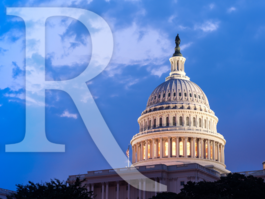26% Rate Supreme Court’s Performance Positively
Americans continue to take a dim view of the U.S. Supreme Court's performance, perhaps in part because most still think the justices base their decisions on their own political agenda rather than the law.
A new Rasmussen Reports national telephone survey finds that just 26% of Likely U.S. Voters think the nation's highest court does a good or excellent job, while just as many (27%) rate its performance as poor. That's consistent with findings for the past year. (To see survey question wording, click here.)
Prior to that time, positives for the court generally remained in the low to mid-30s since 2011. The last time good or excellent marks for the high court were above 40% was in October 2009. A year ago, poor marks for the court his a high of 30% following controversial rulings on voting rights, affirmative action and same-sex marriage.
Sixty-one percent (61%) think most Supreme Court justices have their own political agenda, up just a point from last fall but the highest finding in five years. A year go, 56% felt that way. Twenty-four percent (24%) disagree and think the justices generally remain impartial. Fifteen percent (15%) are not sure.
Thirty-four percent (34%) say the Supreme Court is too liberal. Thirty percent (30%) think the court is too conservative. One in four (25%) say, in political terms, the Supreme Court is about right ideologically. Voters have long tended to view the court as too liberal, but in recent surveys, the number who consider it too conservative has increased.
Thirty-six percent (36%) of voters say the Supreme Court does not put enough limitations on what the government can do. This finding is up nine points from September. Seventeen percent (17%) say it puts too many limitations on government instead, down two points from previous survey. Thirty-two percent (32%) say the balance is just right.
(Want a free daily e-mail update? If it's in the news, it's in our polls). Rasmussen Reports updates are also available on Twitter or Facebook.
The national telephone survey of 1,000 Likely Voters was conducted by Rasmussen Reports on June 18-19, 2014. The margin of sampling error for the survey is +/- 2 percentage points with a 95% level of confidence. Fieldwork for all Rasmussen Reports surveys is conducted by Pulse Opinion Research, LLC. See methodology.
Twenty-six percent (26%) of voters choose the Supreme Court as the branch of government they trust must. This finding is up three points from September. The court is second to the president, who is trusted most by 30%, down three points from last fall. Sixteen percent (16%) trust Congress the most, unchanged from September.
But these numbers are heavily weighted by the partisan nature of the responses. Sixty percent (60%) of Democrats trust the president most which is not surprising giving that the current occupant of the White House is a Democrat. Just four percent (4%) of Republicans and 20% of unaffiliated voters share that view. One-third of GOP and unaffiliated voters are not sure which branch of government they trust the most.
Republicans are the most critical of the high court's performance.
Women and middle-aged adults have the most positive opinion of the Supreme Court. Men are more likely to think the Supreme Court is too liberal and that its justices make their rulings based on their own political agenda.
Forty-six percent (46%) of voters who say they are part of the Tea Party rate the Supreme Court’s performance negatively, compared to 25% of those who are not part of that movement. Half (49%) of those in the Tea Party think the Supreme Court does not place enough limitations on government, a view shared by 34% of non-members.
Seventy-five percent (75%) of the Political Class trust the president the most, but only 21% of Mainstream voters agree.
Fifty-four percent (54%) of all voters consider the federal government today a threat to individual liberty rather than a protector. Just 22% see the government as a protector of individual rights.
Forty-six percent (46%) believe that it is fair for a U.S. senator to oppose a high court nominee because of political ideology or judicial philosophy.
Americans are now evenly divided when asked if the U.S. justice system is fair.
Only 33% of voters believe most judges in their rulings follow the letter of the law.
Additional information from this survey and a full demographic breakdown are available to Platinum Members only.
Please sign up for the Rasmussen Reports daily e-mail update (it's free) or follow us on Twitter or Facebook. Let us keep you up to date with the latest public opinion news.
The national telephone survey of 1,000 Likely Voters was conducted by Rasmussen Reports on June 18-19, 2014. The margin of sampling error for the survey is +/- 2 percentage points with a 95% level of confidence. Fieldwork for all Rasmussen Reports surveys is conducted by Pulse Opinion Research, LLC. See methodology.
Rasmussen Reports is a media company specializing in the collection, publication and distribution of public opinion information.
We conduct public opinion polls on a variety of topics to inform our audience on events in the news and other topics of interest. To ensure editorial control and independence, we pay for the polls ourselves and generate revenue through the sale of subscriptions, sponsorships, and advertising. Nightly polling on politics, business and lifestyle topics provides the content to update the Rasmussen Reports web site many times each day. If it's in the news, it's in our polls. Additionally, the data drives a daily update newsletter and various media outlets across the country.
Some information, including the Rasmussen Reports daily Presidential Tracking Poll and commentaries are available for free to the general public. Subscriptions are available for $4.95 a month or 34.95 a year that provide subscribers with exclusive access to more than 20 stories per week on upcoming elections, consumer confidence, and issues that affect us all. For those who are really into the numbers, Platinum Members can review demographic crosstabs and a full history of our data.
To learn more about our methodology, click here.





